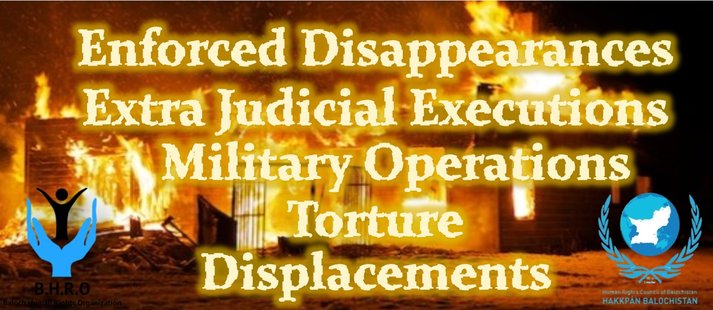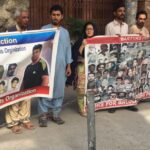Fifty persons were forcibly disappeared by military in seven districts of Balochistan in May this year, reported Baloch Human Rights Organization (BHRO) and Human Rights Council of Balochistan (HRCB) jointly.
BHRO and HRCB were not able to collect data from the other 25 districts.
The victims of enforced disappearance include Abdul Hai son of Mr. Jumma Khan Kurd. He was whisked away by the security forces from Mach town on 21st May. He was sitting in Koh-Baash restaurant when two Vigo pick-ups with more than 20 army personnel accompanied by intelligence agencies, encircled the restaurant and took away Abdul Hai.
Abdul Hai was blindfolded and handcuffed before being escorted to one of the waiting pick-ups. Aged 35, he was a farmer and was the only supporting member of an extended family devastated by a number of enforced disappearances. His brother Ali Sher Kurd was abducted by the same forces and was later found dead in 2010.
Eighteen persons were killed in separate incidents in the month of May. Ten of them died in target killing, 4 mutilated body recovered while Salman Ahmed Badini was shot killed by security forces in an encounter. Salman Badini was believed to be the head of banned Lashkar-e-Jhangvi’s Balochistan chapter.
Moreover, bodies of two previously disappeared persons, Azim Dad Shah and Bozoo Bugti were recovered. Azim Dad, resident of Malar, district Awaran, was found dumped on a roadside in Hub Chowki, district Lasbella, on 05 May 2018. He was abducted by security forces on 25 April 2016 from Jinnah International Airport Karachi, while Bozoo Bugti’s mutilated body was recovered from Zen Koh, district Dera Bugti. He was abducted by security forces during a military operation on January 24, 2018 along with Wasiq Bugti and Huzoor Bakhsh Bugti. The whereabouts of Wasiq and Huzoor Bakhsh remained unknown.
In another incident, a female schoolteacher was killed by unknown gunmen in Dasht area of district Kech. Ms. Bilqis was shot dead at her house. It’s the second incident in two months when a woman has been shot killed by unknown gunmen. Jameela Swali from the same district was shot dead at her house in April 2018. Neither killers nor the reason of their killing is known yet. Another lady, Naz Gul died in illegal detention of security forces, kept at a private house in Mashkay district Awaran, on 6th of April this year.
Abduction of women and children is not a new phenomenon in Balochistan, though not established yet. However, target killing of women is a new trend.
As the government does not allow the media and human rights organization to visit and report the situation, the armed conflict between Pakistan’s central government and the local nationalists of Balochistan has turned the region into a war zone. The government and nationalists often blame each other for the troubles masses face.
The Pakistan military has adopted a policy of enforced disappearances since 2004 to stifle a Baloch nationalist insurgency.
Since 2004, thousands of Baloch activists, poets, students, rights activists and others have been forcibly disappeared. The military keeps their whereabouts unknown and subjects them to torture for months.
In 2009, the situation got worse. The Pakistan military abducted three key Baloch leaders, including Ghulam Mohammad Baloch who was the President of the Baloch National Movement (BNM), from the Turbat city of Balochistan on April 3, 2009. In a week, on April 9, their tortured and bullet-riddled bodies were found dumped near the Turbat city.
It was the beginning of the military’s now infamous kill-and-dump operations, in which they abduct political activists, journalists, educationists, student activists and human rights defenders, and later dump their bodies in desolated areas.


